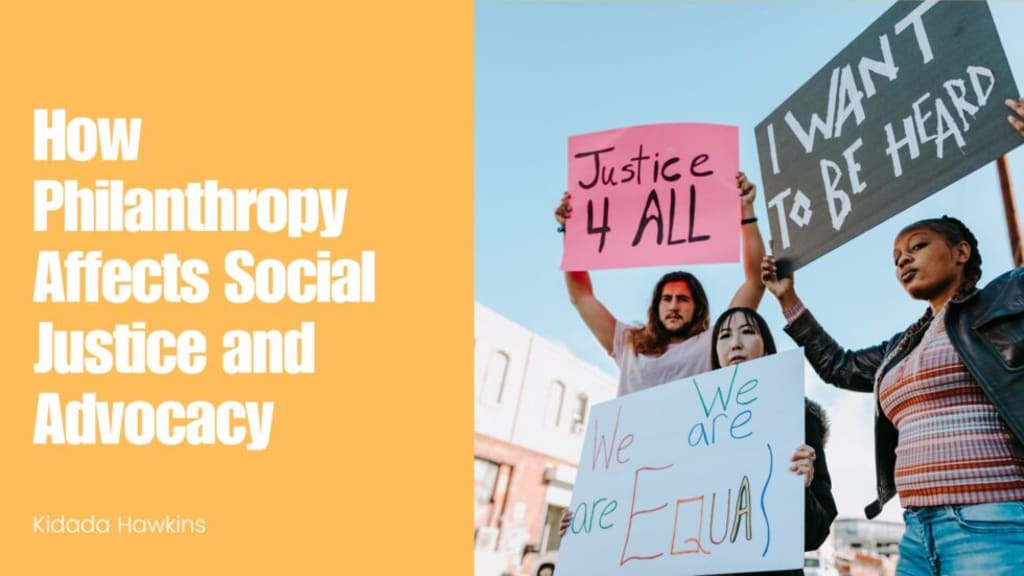How Philanthropy Affects Social Justice and Advocacy
Kidada Hawkins on philanthropy, social justice, and advocacy

Philanthropy is a powerful tool for advancing social justice and advocacy efforts. By providing financial support to nonprofit organizations and grassroots movements, philanthropy can help address systemic inequalities and promote human rights. In addition, philanthropy can encourage corporate social responsibility, creating positive change within the private sector and contributing to a more just and equitable society.
Funding Nonprofit Organizations
One of the primary ways philanthropy affects social justice and advocacy is through funding nonprofit organizations. Nonprofits can address a wide range of social, economic, and environmental issues, including poverty, education, healthcare, and climate change. By providing financial resources to these organizations, philanthropy can help support their vital work, which often involves serving marginalized communities and advocating for policy change. Philanthropic organizations and individual donors can also provide support beyond financial resources, such as mentorship, volunteer work, and in-kind donations.
Supporting Grassroots Movements
In addition to supporting established nonprofit organizations, philanthropy can also play a key role in supporting grassroots movements. These movements are often led by community members who are directly affected by social inequalities and may lack access to traditional forms of funding. By providing resources and support to these movements, philanthropy can help amplify their voices and enable them to achieve their goals. Grassroots movements can take many forms, including local protests, online campaigns, and community organizing efforts.
Addressing Systemic Inequalities
Systemic inequalities are a key driver of social injustice, and philanthropy can help address these issues by supporting organizations and initiatives that focus on promoting equity and justice. This can involve funding research and advocacy efforts that promote policy change, supporting grassroots initiatives that directly benefit marginalized communities, and addressing specific issues such as economic inequality, racial injustice, and environmental degradation. By addressing the root causes of these issues, philanthropy can help create systemic change that benefits everyone.
Promoting Human Rights
Human rights are another critical area where philanthropy can make a significant impact. By supporting organizations that protect the rights of marginalized communities, such as refugees, immigrants, and LGBTQ+ individuals, philanthropy can help ensure that everyone has access to fundamental human rights and freedoms. This can involve providing legal support, funding education and awareness programs, and supporting advocacy efforts that promote policy change. Philanthropy can also play a critical role in responding to crises such as natural disasters, war, and public health emergencies, ensuring that affected communities receive the support they need.
Encouraging Corporate Social Responsibility
Finally, philanthropy can encourage corporate social responsibility by supporting initiatives that promote sustainable business practices, ethical labor standards, and social and environmental responsibility. By investing in companies and organizations that prioritize these values, philanthropy can promote positive change within the private sector and help create a more just and equitable society. This can involve supporting initiatives such as fair trade, organic agriculture, and renewable energy, as well as engaging with companies directly to promote responsible business practices.
In addition to individual philanthropy, institutional philanthropy also plays a crucial role in advancing social justice and advocacy efforts. Foundations, donor-advised funds, and other charitable organizations can leverage their resources and expertise to support a wide range of social and environmental causes, and engage in strategic partnerships with nonprofits and other stakeholders to drive change at scale. By working together, philanthropic organizations and individual donors can help create a more just and equitable world for future generations.
Philanthropy is critical in advancing social justice and advocacy efforts. By funding nonprofit organizations, supporting grassroots movements, addressing systemic inequalities, promoting human rights, and encouraging corporate social responsibility, philanthropy can help create a more just and equitable society for all. If you are interested in supporting social justice and advocacy efforts through philanthropy, consider researching nonprofit organizations aligning with your values and donating to support their work. With your support, we can work towards creating a better future for everyone.
About the Creator
Kidada Hawkins
Based in Auburndale, FL, Kidada Hawkins is a community-minded professional who works in healthcare administration and management.






Comments
There are no comments for this story
Be the first to respond and start the conversation.